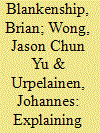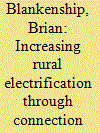|
|
|
Sort Order |
|
|
|
Items / Page
|
|
|
|
|
|
|
| Srl | Item |
| 1 |
ID:
166355


|
|
|
|
|
| Summary/Abstract |
Quality of electricity service remains poor in many developing countries. Here we examine factors that influence stated willingness to pay for better service (i.e., more hours of power per day) among rural and urban households in Uttar Pradesh, India. Besides suggesting that low willingness to pay is a major obstacle to pricing reform, we find that respondents with more social trust are willing to pay more. In a randomized survey experiment, we also find that delays in service improvements and a lack of community support for pricing reform reduce willingness to pay. These results confirm the importance of non-financial considerations in popular support for policies that impose higher prices in exchange for better service. However, we do not find evidence for sense of entitlement – the belief that government should offer basic goods and services for free – as a predictor of low willingness to pay. These results offer useful input for effective strategies to reform electricity pricing for better service and, ultimately, economic growth, particularly in areas where electricity is heavily underpriced and where governance is weak.
|
|
|
|
|
|
|
|
|
|
|
|
|
|
|
|
| 2 |
ID:
176661


|
|
|
|
|
| Summary/Abstract |
To reach the United Nations Sustainable Development Goal of universal household electrification by 2030, developing countries are spending billions of dollars to expand access. India, for example, recently undertook an audacious expansion plan which aimed to electrify every household by December 2018. However, there is little academic study of strategies to increase electrification rates. We argue that significant transaction costs inhibit household applications for connections. As evidence, we report the results of a randomized controlled trial (in 200 communities and 2000 households) in the Indian state of Uttar Pradesh, with a treatment consisting of an informational campaign about the costs and procedure of applying. We found that households exposed to the campaign were three times as likely to apply for a connection. Yet actual connection rates remained unchanged. The results suggest that transaction costs are an important barrier to electrification, but limited capacity and incentive to expand connections are equally important.
|
|
|
|
|
|
|
|
|
|
|
|
|
|
|
|
| 3 |
ID:
185717


|
|
|
|
|
| Summary/Abstract |
As the global economy transitions to greater reliance on renewable energy, it is crucial that this be a Just Transition in which new jobs are created to offset reduced opportunities in fossil fuels. This is critical to mitigate political opposition to the renewable energy transition. We use a survey experiment in Jharkhand, one of India's largest coal-producing states, to identify the characteristics that make alternative jobs attractive compared to coal jobs. We provide evidence of a coal penalty: respondents were 36.2 percentage points [95% CI: 33.1–39.5] less likely to choose coal jobs than alternatives. Additionally, respondents were much more likely to select high-paying jobs, while distance was not a strong deterrent to job selection. The findings indicate that coal jobs are unpopular on the margin, and suggest the viability of policies such as jobs training programs and relocation assistance that allow workers to take advantage of higher-skilled, higher-paid livelihoods.
|
|
|
|
|
|
|
|
|
|
|
|
|
|
|
|
| 4 |
ID:
184243


|
|
|
|
|
| Summary/Abstract |
Existing scholarship on alliance burden sharing focuses on explaining why smaller allies often undercontribute relative to their larger partners. However, the literature largely neglects the role played by great-power pressure in shaping burden-sharing outcomes. I argue that rather than being a product of rational free riding, allies’ defense efforts are often a response to their patron’s threat of abandonment. When a patron can more credibly threaten to reduce its protection, and when doing so would impose serious costs on allies, the former is better positioned to elicit burden sharing. I test the theory using data on allied burden sharing in US alliances from 1950 to 2010. The results show that allies exhibit higher levels of burden-sharing efforts when they are geographically vulnerable to attack, whereas allies exhibit lower levels of burden sharing when they are in geostrategic locations valuable to the United States.
|
|
|
|
|
|
|
|
|
|
|
|
|
|
|
|
| 5 |
ID:
173781


|
|
|
|
|
| Summary/Abstract |
The literature on economic statecraft has long focused on the effectiveness of foreign aid and trade as tools of inducement. However, existing scholarship largely neglects the role played by government procurement. By choosing to purchase goods or hire labor in foreign states, governments can provide economic benefits for strategic ends. The United States in particular leverages its defense procurement as a foreign policy tool. We introduce a new data set of US government procurement using information on all contracts executed overseas from 2000 to 2015. We develop a typology of how states use procurement to achieve foreign policy goals—power projection, counterinsurgency, and development—and provide descriptive statistics to explore variation in spending across countries and over time. We illustrate the power of the contract data by using it to code US military access in Africa, assess the relationship between spending and economic growth, and test whether economic inducements can buy influence.
|
|
|
|
|
|
|
|
|
|
|
|
|
|
|
|
| 6 |
ID:
188887


|
|
|
|
|
| Summary/Abstract |
Russia’s invasion of Ukraine has led to a resurgence of policy attention toward reassurance—an attempt to increase an ally’s feeling of security from external threat. In our recent article, “Trivial Tripwires? Military Capabilities and Alliance Reassurance,” we assess how states can most effectively reassure their allies. We introduce a new typology of reassurance measures based on the interaction of capability and resolve, and test it using case studies and data from original expert surveys. We find that in northeastern Europe, high-resolve signals (for example, tripwire forces) are not viewed as any more reassuring than high-capability, low-resolve signals (for example, forces stationed offshore). Put differently, high resolve cannot offset low capability.
|
|
|
|
|
|
|
|
|
|
|
|
|
|
|
|
| 7 |
ID:
188214


|
|
|
|
|
| Summary/Abstract |
How can states most effectively reassure their allies? Existing studies assessing signals of commitment focus on the role of resolve in making assurances credible. This sidelines important questions about the role of capability. We argue that reassurance effectiveness is the product of both capability and resolve, and suggest that high resolve cannot offset low capability. We introduce a new typology of reassurance measures based on the interaction of military capability and resolve, and test which types of measures are most reassuring using an original survey fielded on European foreign policy experts and a case study of US and North Atlantic Treaty Organization reassurance initiatives in the Baltics. We find that high-resolve, low-capability signals such as tripwire forces in allied territory are not viewed as any more reassuring than high-capability, low-resolve signals such as forces stationed offshore. Our study casts doubt on the reassurance value of tripwires and contributes to scholarship on interstate signaling.
|
|
|
|
|
|
|
|
|
|
|
|
|
|
|
|
| 8 |
ID:
157902


|
|
|
|
|
| Summary/Abstract |
A prominent theory holds that groups may use terrorism in order to provoke governments into undertaking repression that alienates the population. However, virtually no studies have addressed the central puzzle of this provocation logic: why states would actually fall into this trap, if doing so can backfire. This study seeks to address this puzzle by suggesting conditions under which states would respond to terrorism with repression. I argue that states with limited bureaucratic capacity are more prone to using repression after terrorist incidents, as their ability to selectively crack down is inhibited by their more limited capability for controlling, monitoring, and collecting revenue from their populations and for collecting intelligence on suspected terrorists. Using a cross-national analysis with data from 1981 to 2011, I find it is low-capacity states which are most likely to respond to terrorism with repression, while constraints on executive authority have no clear effect.
|
|
|
|
|
|
|
|
|
|
|
|
|
|
|
|
|
|
|
|
|